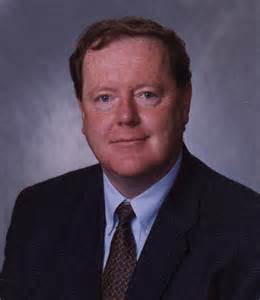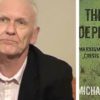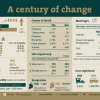041: Dermot Hayes on Comparative Advantage, Feeding the Chinese and the Malthusian Catastrophe
Dermot Hayes is the Pioneer Chair of Agribusiness, professor of economics, and professor of finance at Iowa State University. He heads the Trade and Agricultural Policy Division at CARD, a position he also held from 1990 through 1998.
Trade and Agricultural Policy Division at CARD, a position he also held from 1990 through 1998.
He is co-director of the Food and Agricultural Policy Research Institute, a research center dually administered through the Centre for Agricultural and Rural Development (CARD) at Iowa State and at the University of Missouri at Columbia. He is also a leader of the Policy Task Force of the Plant Science Institute at Iowa State.
A native of the Republic of Ireland, Dermot obtained his degree in agriculture science from University College, Dublin and his Ph.D. from University of California, Berkeley with a major in international trade.
Dermot has distinguished himself with many awards at the college and university levels for his work as a teacher and researcher.
In 2006 he received a Publication of Enduring Quality award from the American Agricultural Economics Association, who subsequently named him a Fellow in 2007.
Besides his analysis of U.S. farm policy and international agricultural trade, Dermot’s other research interests include food safety, livestock modelling, demand analysis, and commodity markets.
Economics:
In this interview, Dermot mentions and discusses: market inefficiencies, government intervention, agricultural economics, property rights, comparative advantage, autarky, incentives, scarcity, Malthusian Catastrophe, free-trade, unemployment, subsidies and taxes.
Economists:
In this interview, Dermot mentions and discusses: Jason Shogren, Paul Dolan, David Zetland, David Simon, Adam Smith, Thomas Malthus, David Zilberman, Milton Friedman and Josh Angrist.
Influencer:
Milton Firedman
“Whenever prices rise, farmers and technology companies have an incentive to work harder to take advantage of high prices. And of course they do that by producing more and that brings prices back down again.” – Dermot Hayes
“Malthus was wrong. He was a negative person. But having said that, with more people and less efficient use of land, we are going to have to bring more land into cultivation – this is devastating to the environment.” – Dermot Hayes
In this episode, you will learn:
- how China is finding ways to feed its people and how self-sufficiency no longer works.
- about China’s ever-increasing demands for soybeans, sugar, wine, etc and how this is putting demands on the global agricultural industry.
- how Ireland lost its comparative advantage in milk production by joining the EU.
- about Kerrygold Irish grass-fed butter and Bullet-proof coffee.
- why Kerry Group are only ‘scratching the surface’ in the US market.
- what high-value, labor-intensive products China should concentrate on producing in order to feed their population and trade with other countries.
- about if the Chinese government owns much of the land and property rights in China.
- ‘terminator seeds’ and how private companies could be incentivised to manufacture them.
- about the use of beta agonists, such as ractopomine, in the use of animal food production.
- why Europe’s method of testing agricultural technologies frustrates Dermot.
- about Dermot’s work on free-trade agreements between countries.
- about Dermot’s ‘controversial’ ethanol research paper.
- why Dermot created a formula that allowed the price of corn to track crude oil prices and how he bought agricultural land based on his findings.
- how academic research can open up hatred and attacks amongst your peers and the industry to which you maybe researching.
- what advice Dermot would give a government regarding the taxing and subsidies of goods and services for the purpose of trade.
Takeaway:
“If you haven’t travelled to strange places like Burma or Uruguay, find a way to do so and you’l come back a changed person.” – Dermot Hayes
Recommended Books:
- Free to Choose by Milton Firedman
Podcast: Play in new window | Download
 103: Brian Mills on the Labor Market in Baseball, the Umpire Strikes Back and R
103: Brian Mills on the Labor Market in Baseball, the Umpire Strikes Back and R 031: Matt Rousu on Experimental Auctions and the Need for Peer-Reviewed Economic Impact Studies.
031: Matt Rousu on Experimental Auctions and the Need for Peer-Reviewed Economic Impact Studies. 083: Stephen Kinsella on Stock Flow Models, Rent Controls and Being the Green Lantern of Economics
083: Stephen Kinsella on Stock Flow Models, Rent Controls and Being the Green Lantern of Economics 085: Michael Roberts on Understanding Karl Marx and His Thinking on Capitalism
085: Michael Roberts on Understanding Karl Marx and His Thinking on Capitalism 074: Peter Leeson on The Invisible Hook: The Hidden Economics of Pirates
074: Peter Leeson on The Invisible Hook: The Hidden Economics of Pirates 077: The Irish Economy 100 years on from the 1916 Easter Rising
077: The Irish Economy 100 years on from the 1916 Easter Rising 069: Diane Coyle on GDP, Its Shortcomings and Alternative Measures
069: Diane Coyle on GDP, Its Shortcomings and Alternative Measures 086: Philip Pilkington on Determinism and the Reformation in Economics
086: Philip Pilkington on Determinism and the Reformation in Economics 006: Andrew Heaton on Using Comedy to Explain Economic Concepts
006: Andrew Heaton on Using Comedy to Explain Economic Concepts 052: Alex Tabarrok on Globalisation, Bounty Hunters and Leveraging Online Education
052: Alex Tabarrok on Globalisation, Bounty Hunters and Leveraging Online Education
 David Zetland
David Zetland
August 27, 2015 at 12:26 pmNice interview. I’m going to quibble with Dermot’s claim that “farmers have no power.” We know that they — as a small group exploiting the large — in theory (following on Olson’s logic of collective action). We also know that corn farmers (paying Dermot’s salary, it must be said) ALSO receive $billions in subsidies and other aid (free extension; trade protection/promotion; ethanol mandates), so I’d say that they exert power contrary to the interests of the American people, poor farmers around the world, and the environment (corn production uses and pollutes LOTS of water).
 Frank
Frank
August 27, 2015 at 4:35 pmI must agree with you David regarding the claim that “farmers have no power”. Agri-firms, such as Monsanto as well as many agri-related businesses (tobacco, biofuel, food manufacturing and logging) spend hundreds of millions dollars per year lobbying Washington. They hold up bills relating to food labelling and climate change. They are heavily subsidized and well protected. Perhaps the small farmer is different, particularly those who strive to make changes for the betterment of animal welfare, human health and a cleaner environment.
 David Zetland
David Zetland
August 29, 2015 at 12:33 pmRelated:
http://www.aguanomics.com/2014/08/do-water-subsidies-help-small-farmers.html